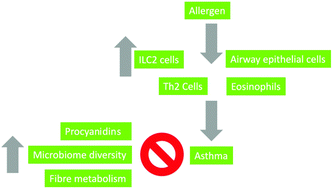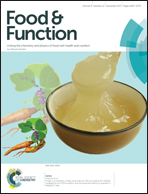Progress in the understanding of the pathology of allergic asthma and the potential of fruit proanthocyanidins as modulators of airway inflammation
Abstract
Allergic asthma is a chronic inflammatory lung disease characterized by sensitization of the airways, and the development of immunoglobulin E antibodies, to benign antigens. The established pathophysiology of asthma includes recurrent lung epithelial inflammation, excessive mucus production, bronchial smooth muscle hyperreactivity, and chronic lung tissue remodeling, resulting in reversible airflow restriction. Immune cells, including eosinophils and the recently characterized type 2 innate lymphoid cells, infiltrate into the lung tissue as part of the inflammatory response in allergic asthma. It is well established that a diet high in fruits and vegetables results in a reduction of the risk of developing inflammatory diseases. Secondary plant metabolites, such as proanthocyanidins which are found in apples, blackcurrants, boysenberries, cranberries, and grapes, have shown promising results in reducing or preventing allergic asthma airway inflammation. Recent evidence has also highlighted the importance of microbiome-mediated metabolism of plant polyphenols in modulating the immune system. In this review, we will discuss advances in our understanding of the pathophysiology of allergic asthma, including the role of the microbiome in lung immune function, and how proanthocyanidins modulate the airway inflammation. We will highlight the potential of dietary proanthocyanidins to impact on allergic asthma and the immune system.

- This article is part of the themed collection: Berry Health Benefits Symposium


 Please wait while we load your content...
Please wait while we load your content...